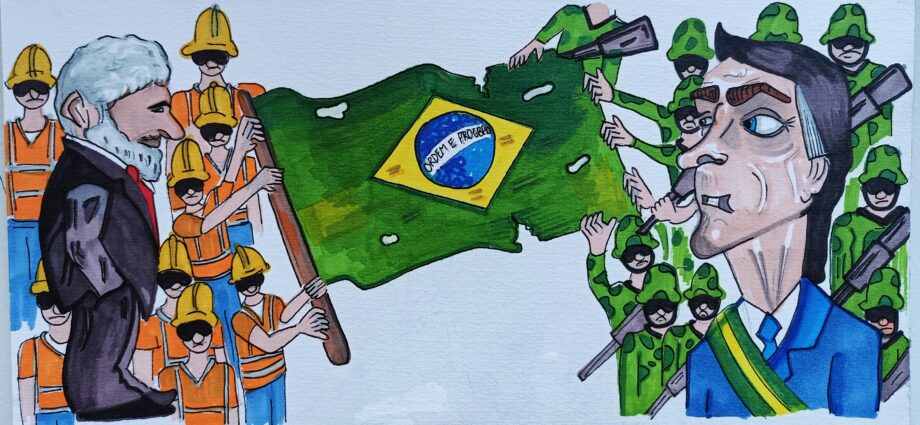Written by Luiza Jacovaz
In times of elections, a mix of feelings, ideologies, perspectives and opinions are put at stake in a country. Citizens argue, social media posts are published every second with thousands of opinions and political campaigns, and the country begins its electoral race.
When it comes to presidential elections, Brazilian politics offers a vivid example of how its democracy is threatened by the polarization among the population regarding political parties and its candidates. Right now, Jair Messias Bolsonaro and Luiz Inácio Lula da Silva are in the battle for the next presidency.
In 2018, Jair Bolsonaro won his first presidential election in Brazil with 55.2% of the votes. His electoral campaign was mainly motivated by the alleged fight against corruption, crimes, and the purpose to ease gun laws. Bolsonaro, a conservative, extremely religious, and a fierce military defensor, used inflammatory rhetoric and militarism as electoral tools to strengthen his popular support.
In one of his public speeches, the President (who now seeks reelection) stated: “We’ve got to let everyone have guns, just like in the United States. I’d let truck drivers and security guards have guns, for example. It’s like the Wild West out here, but only one side is allowed to shoot.” Considering the ongoing, and growing crisis of public security, right-wing supporters have found in Bolsonaro’s extremism a hope for a safer country. But how is Brazil now, after Bolsonaro’s mandate? What is the future of this year’s elections?
Bolsonaro’s Electoral Promises – 2018
Jair Bolsonaro has focused on radical and ambitious promises ever since he was made a public figure in Brazil. In 2018, his infamous campaign relied on:
- Privatizing or extinguishing most of State-owned enterprises;
- Allowing citizens to possess a greater access to firearms;
- Rejecting possible proposals to legal abortion;
- Rejecting fundings to Human Rights Organizations;
- Reducing the age of criminal responsibility from 18 to 16;
- Restarting the death penalty in Brazil;
- Ending affirmative action at Brazilian Public Universities;
These electoral promises, among several others, were supported by his conservative electorate. In addition to his supporters, a generalised disillusionment with the former President Lula and the high rates of corruption in Brazil corroborated with Bolsonaro’s victory.
Due to Lula’s corruption convictions and his later arrest, as well as the lack of trust in the federal government, Bolsonaro presented himself as an anti-establishment candidate. Polarization, therefore, is not new in the Brazilian political scenario.
History is repeating itself, and it is time for Brazilians to make a big decision again.
Lula’s Background
Luiz Inácio Lula da Silva was the President of Brazil from 2003 to 2011. Before entering politics, Lula, who is the son of poor farm workers, was a metallurgical worker. When he launched his campaign, his objectives were to reduce poverty, provide major economic and political reforms, develop several social programmes, and focus on the workers’ situation in Brazil.
However, the ‘man of the people’, who was greatly admired by many Brazilians and fellow
South American countries, was later found in the middle of the greatest corruption scandal in Brazil. ‘Operation Car Wash’ is the name given to the investigation which has brought to light several corruption schemes, including the misuse of funds within Petrobras (Brazil’s state oil company), and Lula’s penthouse apartment.
In 2017, Lula was convicted of accepting a bribe in exchange for political favours: the mentioned apartment. Although he was absolved in one of six pending legal cases, he is marching again on his way to politics after some time in prison.
Current Situation – 2022 Elections
A divided battle between a right-wing candidate and a left-wing one has officially begun.
According to the Brazilian Institute of Public Opinion and Statistics (IBOPE), Lula holds 44% of voter support, while Bolsonaro holds 32% in the first round of the election. In addition to that, the electoral race has narrowed in the past few weeks, and Lula da Silva seems to be leading towards the presidency.
To better explain this current scenario, three main factors are being considered by the population in this election: economic situation (43% elected this as the most important reason why a candidate should win the 2022 elections), good mandate in the past (17%), and the honesty of a candidate (7%). When it comes to Brazil’s economic situation, Lula is leading with 48% of the votes, while Bolsonaro holds 20%. Nevertheless, the honesty of a candidate changes these previous percentages, as Lula’s corruption scandals still haunt him. Bolsonaro would reach 59% of voter support, Lula only 7%.
How Polarized Elections Threaten Democracies
The division of a population in distinct political camps is extremely harmful for the maintenance and proper function of a democracy. Deep political cleavages damage the ability of a nation to cooperate and solve societal challenges as one united entity.
Additionally, the depreciating diversity among the population comes as a by-product of the growing polarization – a cause for major concern. The richness of options in addressing common problems are absent when there are only two leading ideologies and/or political parties. “Democracy, which is a system built on diversity, is also a system built to manage diversity”. Therefore, the emergence of political polarization threatens the core of democracy: heterogeneity.
Four years later, Brazil is facing this problem again. A political fight has taken place, and insecurity is now leading the ballots.
Edited by Veda Rodewald, artwork by Lena Cohen Zennou

